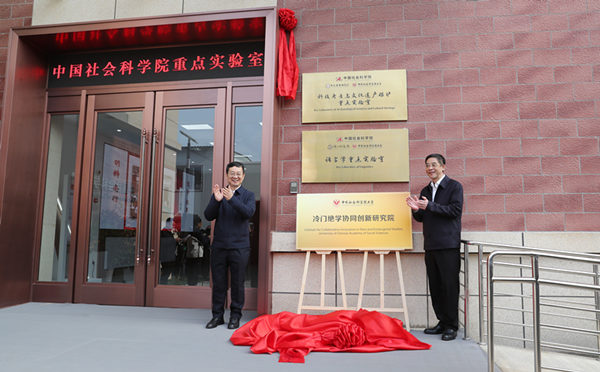


Gao Xiang (left), CASS president and secretary of the leading Party members’ group at CASS, along with Peng Jinhui, CASS vice president and deputy secretary of the leading Party members’ group at CASS, unveiled the Key Laboratory of Archaeological Sciences and Cultural Heritage, the Key Laboratory of Linguistics, and the Institute for Collaborative Innovation in Rare and Endangered Studies. Photo: Zhu Gaolei/CSSN
On Nov. 15, the Chinese Academy of Social Sciences (CASS) held a ceremony to inaugurate three new key labs. Gao Xiang, CASS president and secretary of the leading Party members’ group at CASS, along with Peng Jinhui, CASS vice president and deputy secretary of the leading Party members’ group at CASS, unveiled the Key Laboratory of Archaeological Sciences and Cultural Heritage, to be administered by the Chinese Academy of History and the University of the Chinese Academy of Social Sciences (UCASS); the Key Laboratory of Linguistics, overseen by the Institute of Linguistics at CASS and UCASS; and the Institute for Collaborative Innovation in Rare and Endangered Studies, subordinate directly to UCASS.
Zhen Zhanmin, CASS vice president and a member of the leading Party members’ group at CASS, Hang Yuanxiang, head of the Discipline Inspection Group sent to CASS by the CPC Central Commission for Discipline Inspection and the National Supervisory Commission and a member of the leading Party members’ group at CASS, and Zhao Zhimin, secretary general of CASS and a member of the leading Party members’ group at CASS, attended the ceremony. Zhao Rui, CASS vice president and a member of the leading Party members’ group at CASS, chaired the event.
Prior to the ceremony, CASS leaders, including Gao Xiang, inspected the Key Laboratory of Archaeological Sciences and Cultural Heritage and the Key Laboratory of Linguistics, to assess their construction progress, talent cultivation, and key research projects.
The establishment of the labs reflects CASS’s commitment to implementing the spirit of key speeches by General Secretary of the CPC Central Committee Xi Jinping, and adhering to the three consensuses reached by CASS as a whole: running CASS well in accordance with the requirements raised by General Secretary Xi Jinping and the CPC Central Committee, committing to serving General Secretary Xi Jinping and the CPC Central Committee, and regarding Xi Jinping Thought on Socialism with Chinese Characteristics for a New Era as the banner and soul of philosophy and social sciences for the new era.
The move aims to vigorously promote institutional, theoretical, and methodological innovation in philosophy and social sciences labs, while striving to establish a lab cluster that can deliver tangible outcomes within CASS, make notable contributions to related industries, and generate national influence.
In 2024, the leading Party members’ group at CASS formulated comprehensive plans and mobilized the think tank’s full resources to develop key labs, relocating the Key Laboratory of Archaeological Sciences and Cultural Heritage and the Key Laboratory of Linguistics to UCASS to fully upgrade and revamp them.
Meanwhile, in accordance with decisions and arrangements made by the leading Party members’ group, UCASS established the Institute for Collaborative Innovation in Rare and Endangered Studies to intensify the development of rare and endangered disciplines.
The Key Laboratory of Archaeological Sciences and Cultural Heritage consists of 13 sub-labs for archaeological sciences, 5 sub-labs for the preservation of cultural heritage, and 5 joint labs for archaeological sciences. It is dedicated to organizing and conducting cross-disciplinary, cross-institution research on archaeological sciences and cultural heritage protection by comprehensively applying advanced technologies in biology, molecular biology, chemistry, geology, physics, and other disciplines.
Within the Key Laboratory of Linguistics there are 3 sub-labs, encompassing phonetics and speech science, cognitive psycholinguistics, and linguistic resources and smart technologies. Leveraging cutting-edge technologies and research approaches in such fields as phonetics, lexicology, cognitive linguistics, computer science, artificial intelligence, and cognitive neuroscience, the lab will focus on services pertaining to language competence in public welfare development, and the construction and provision of fundamental linguistic data resources.
The Institute for Collaborative Innovation in Rare and Endangered Studies is devoted to cultivating professional reserve talent for areas like Manchu studies, studies of bamboo and silk manuscripts, Turkology, and classics. Currently, it has opened core courses including Manchu, Introduction to Studies of Bamboo and Silk Manuscripts, Introduction to Western Xia Studies, Ancient Greece, Ancient Latin, and Paleography. Efforts have also been made to create a national science and education alliance for rare and endangered studies together with related universities and research institutions in China.
The ceremony was hosted by CASS and organized by the Bureau of Scientific Research Management at CASS and UCASS. Staff members from the National Office for Philosophy and Social Sciences, the National Cultural Heritage Administration, and some institutions under CASS participated in the event, during which they visited an exhibition showcasing lab construction at CASS. On the same day, a symposium on the construction of labs for philosophy and social sciences was also held.